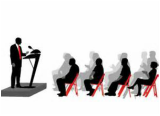
When you are speaking to a reporter, remember that you are really speaking to your audience through the reporter. However, you can only reach people effectively if you give the reporter information they will use.
Speak To Humans
That's why avoiding industry jargon is so important. Use catchy phrases and give short answers. Most importantly, you have to show the public why your concerns should be their concerns. Just saying that the issue is important to you won’t win over your audience. The reporter's job is to gather information that affects their audience. By showing how the audience will be affected, you can help yourself, your audience and the reporter.
It’s also important to stay away from too many statistics while the camera rolls. Save the stats for the background information or wait until the reporter asks for them. Too many statistics on camera is a guaranteed yawn for your audience.
Before the media questions you, question yourself. What points are you trying to make? Limit them to three. Your message will depend on your audience. Parents, children, judges, lawmakers? Address your answers to them. Remember, when someone is watching television they’re usually doing something else like cooking, eating dinner, washing clothes, or helping their children with with homework. You have to get their attention and the only way to do that is to make them care.
Negative Words
Sometimes reporters will put a “buzzword” in their question to get you to repeat it. That's dangerous. For example, if a reporter asks if you are "overwhelmed" and you respond with, "My job is not overwhelming," the audience only hears the negative word. The answer should be positive, such as, “I believe no job is too difficult and I am working through my challenges.” A decades old example of using a negative word, still cited today by many: What do you think the audience really heard when Richard Nixon said, “I am not a crook”?
When you speak to your audience about their concerns, limit your points and stay away from negative words and jargon, you are, in effect, editing yourself. The result will be effective, motivating messages.
Speak To Humans
That's why avoiding industry jargon is so important. Use catchy phrases and give short answers. Most importantly, you have to show the public why your concerns should be their concerns. Just saying that the issue is important to you won’t win over your audience. The reporter's job is to gather information that affects their audience. By showing how the audience will be affected, you can help yourself, your audience and the reporter.
It’s also important to stay away from too many statistics while the camera rolls. Save the stats for the background information or wait until the reporter asks for them. Too many statistics on camera is a guaranteed yawn for your audience.
Before the media questions you, question yourself. What points are you trying to make? Limit them to three. Your message will depend on your audience. Parents, children, judges, lawmakers? Address your answers to them. Remember, when someone is watching television they’re usually doing something else like cooking, eating dinner, washing clothes, or helping their children with with homework. You have to get their attention and the only way to do that is to make them care.
Negative Words
Sometimes reporters will put a “buzzword” in their question to get you to repeat it. That's dangerous. For example, if a reporter asks if you are "overwhelmed" and you respond with, "My job is not overwhelming," the audience only hears the negative word. The answer should be positive, such as, “I believe no job is too difficult and I am working through my challenges.” A decades old example of using a negative word, still cited today by many: What do you think the audience really heard when Richard Nixon said, “I am not a crook”?
When you speak to your audience about their concerns, limit your points and stay away from negative words and jargon, you are, in effect, editing yourself. The result will be effective, motivating messages.





 RSS Feed
RSS Feed